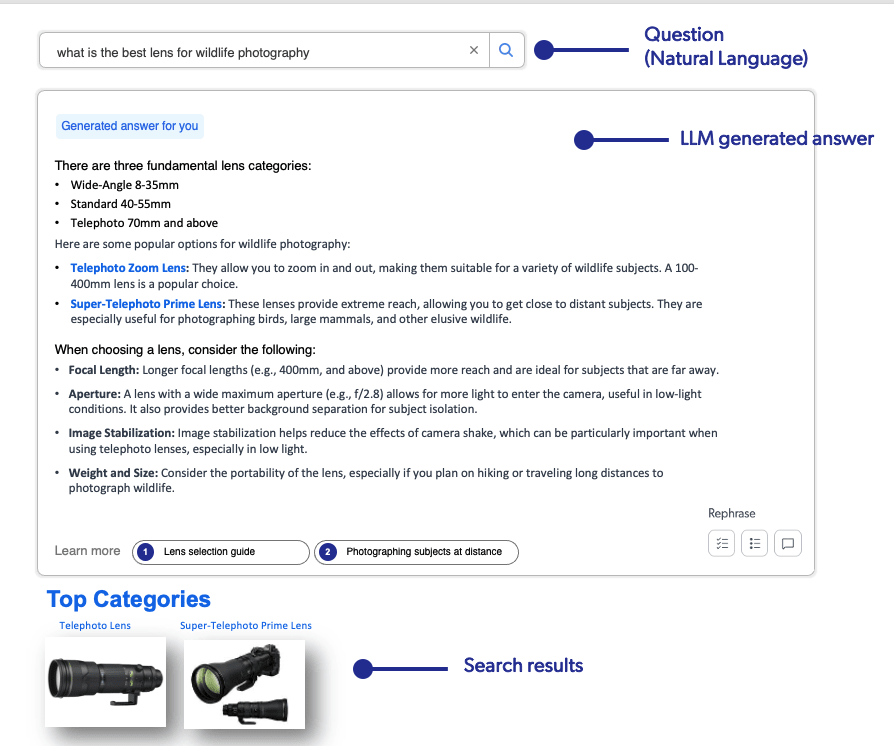The pendulum of preference between in-store and online shopping continues to swing, with those deeply invested in ecommerce winning out over the recent Cyber Weekend. Online sales reached a fever pitch of $9.8billion during U.S. Black Friday, with projections showing between $10.3 and $12.4 billion by the end of the weekend.
Cyber Weekend can be a barometer of how holiday shopping will trend, but does this also showcase what’s in store for retailers in 2024? Needing to support multiple channels isn’t new, but capturing success is something the industry continues to explore. To this end, we’ve identified three trends that continue to evolve from this year into the next: how generative AI fits into ecommerce, the growing need for cookieless personalization, and operational flexibility.
Addressing these trends requires the right technology. In this post, we look at these three major commerce trends and how enterprises can work with Coveo’s newest platform updates to achieve an unparalleled customer experience.
Trend #1: Generative answering for product discovery and education
The excitement of ChatGPT will bleed over into shopper expectations.
In traditional in-store interactions, customers naturally ask product-related questions. Replicating this ease of inquiry in an online environment has been a challenge — until now. Using generative answering in ecommerce to get conversational answers in a digital environment will lead to a change in how people shop and purchase.
Product discovery is key to helping online shoppers get the most out of their experience. It includes the ability for customers to find relevant products they might not know about, alternatives when the item they want isn’t available, and products they might be interested in based on browsing history, past shopping behavior, and other signals.
Shoppers visit websites with diverse intentions – some to buy, others for inspiration, and some driven by online ads. A crucial group seeks product education. Generative answering can play a pivotal role in catering to this informational need.
For example, if a shopper is looking for the best lens to choose for wildlife photography, generative AI like Coveo Relevance Generative Answering™ can generate a summary of the best attributes to look for and expert recommendations.

Digital commerce companies with vast amounts of buying guides, inspirational how-tos, and other rich content. They can use these to generate conversational answers to guide shoppers towards the best products for their needs. This is especially relevant in verticals like distribution, home improvement, grocery, life sciences, B2B manufacturing, and home improvement.
For instance, on a home improvement site, if a buyer asks for tips on building an outdoor kitchen with a barbecue, Coveo’s Relevance Generative Answering can provide curated advice specific to that query, enhancing the shopper’s experience.
Trend #2: Is it personalization vs privacy? Or can shoppers have both
Feeling recognized can often be the difference between an in-person shopping experience and a digital one. This is where personalization comes in.
While this isn’t necessarily a brand new trend, achieving personalization as we move away from the reliance on third-party cookies is new. It’s a dominant trend for 2023 and will continue as we move into the new year. Cookieless personalization will increasingly rely on first- and zero-party data.
While this shift requires new strategies and technologies, it offers opportunities for more accurate, privacy-compliant, and effective personalization. In 2023, businesses adopted session-based recommendations and deep machine learning models to provide personalized shopping experiences. These methods ensure relevant, privacy-conscious experiences, even when traditional cookies are unavailable.
Coveo’s platform supports personalization without third-party cookies in a few ways including:
- Our Personalization-as-you-go feature is built with vectors that are created from shoppers’ session data which are then ‘embedded’ on the products, rather than relying on third-party cookies, allowing for personalized shopping experiences. This allows for more predictive suggestions as shoppers type in the search box or a re-ordering of the results set. This is ideal for retailers who have large and broad catalogs that serve a wide variety of interests or profiles.
- Coveo supports personalized product discovery using machine learning models like search recommendations and generative answering.
- Our machine learning models analyze user behavior and preferences to provide more relevant search results and, as noted above, reduce the number of no result pages.
We’ve also expanded our product badging feature in our merchandising hub app that allows retailers to add badges to products on the storefront. Product badges can be customized to display compelling information like best sellers, new arrivals, sale items, or social proof.
Product badging supports personalization by allowing users to target specific audiences with badges and control badge visibility on product listing pages. ML models analyze user behavior and preferences to provide personalized badges and recommendations based on each shopper’s unique interests and needs.
Trend #3: Operational flexibility is the new differentiator
According to Nielson, half of consumers say they “shop the omnichannel,” meaning they use a combination of online and offline channels to meet their shopping needs. A real-world example is using a QR code in store to digitally explore the full offering of available furniture colors and fabrics on a brand’s website — with fully fitted product display pages that offer additional recommendations that build upon the experience.
Serving these various touch points requires a flexible tech stack that can support the evolving ecommerce landscape. This brings us to some of the most popular buzzwords this year (and likely into next): headless, composable, MACH, and so much more.
Although there are many ways to implement it, the overall concept is a technology architecture that allows for greater business agility, a better digital experience for your customers, and increased consistency between all of your channels.
Coveo supports composable commerce in several ways, including through:
- Native connectors and custom connector frameworks that connect to any index type. Coveo indexes content as well as product data, allowing retailers to connect and integrate data from various channels and sources.
- Composable AI search and recommendation capabilities that help shoppers find relevant products and make informed decisions based on their past shopping behavior across all channels.
- Overall, Coveo’s AI platform is designed to help businesses deliver personalized and relevant experiences to their customers, which can ultimately lead to a better shopping experience.
Coveo’s commerce capabilities support omnichannel shoppers when they’re on your website by including relevant product messaging, rebadging and social proof elements, personalized product discovery, and generative answering capabilities. We’ve seen these features improve the revenue per visitor metric by 1-3% across our early adopter clients.
Our native and custom connectors, combined with our search experience, makes it relatively simple for retailers to embrace generative AI in a safe environment. Improving product discovery and search functionality is the foundation of a great ecommerce experience — and this is a trend we’re happy to help support.
A Full-Stack, Composable Platform
Ecommerce isn’t about isolated interactions. It’s an entire journey of connected experiences — discovery, education, purchase, post-sale support, etc. — that a user takes as they navigate a company’s online and offline ecosystem. To deliver great experiences across multiple touchpoints in a way that makes sense, you need to connect channels, data, and technology. It’s easy to get this wrong.
A seamless, cohesive service experience requires advanced technologies like machine learning and a unified index — two ingredients that enable AI search engines like Coveo to meet users wherever they are on their journey. The trends we’ve discussed — effortless support, personalized interactions, and AI integration — aren’t going to disappear anytime soon.
As we move forward, full-stack, composable platforms like Coveo will become catalysts for successful support strategies. By providing a composable infrastructure that is both robust and flexible, Coveo enables businesses to respond to and anticipate support trends. (Not to mention reshape them.)
Interested in any of the above described solutions? Contact us for a free consultation with a Coveo AI expert!
Dig Deeper
Experience is today’s biggest differentiator. Discover Coveo’s unique capabilities to inject AI across every touchpoint of your customers’ journey.


